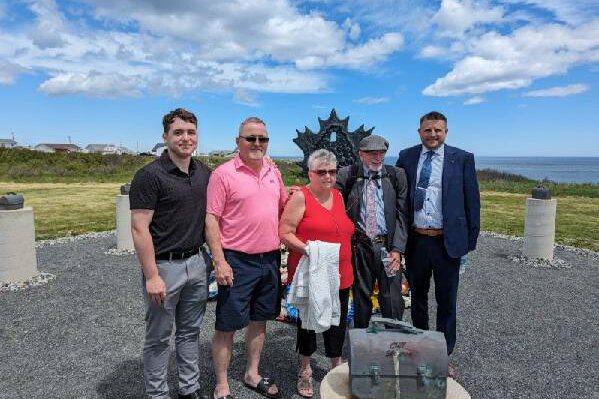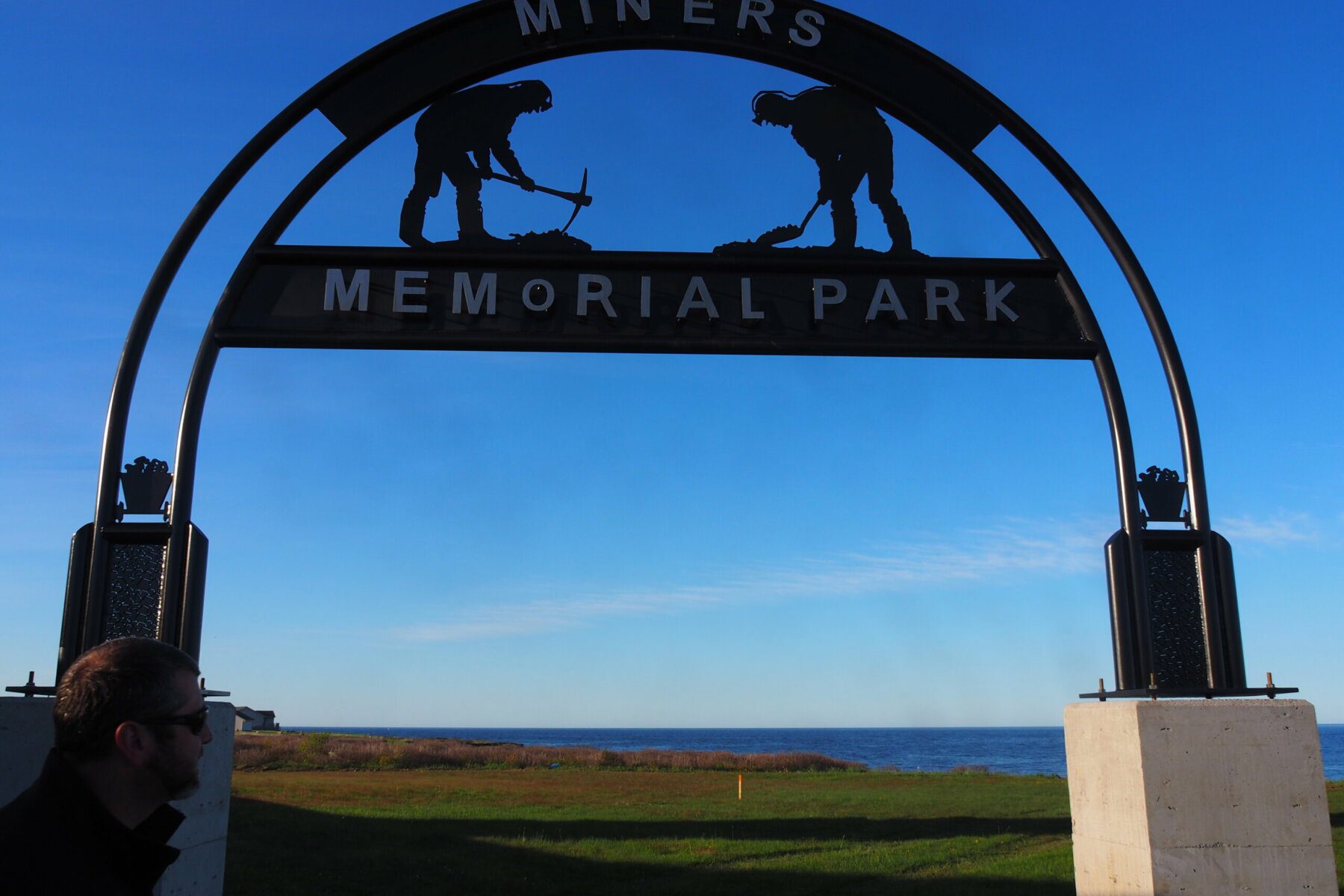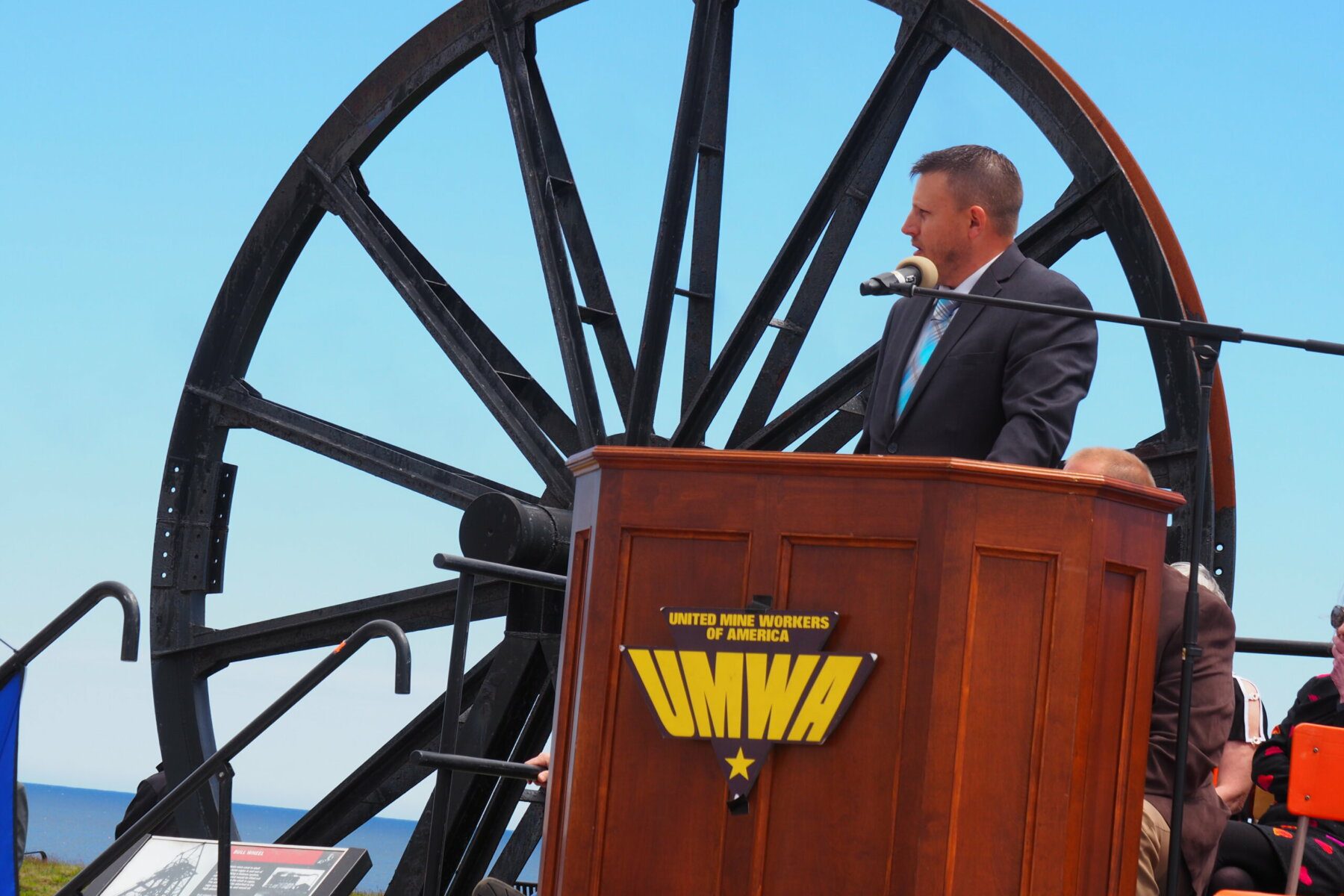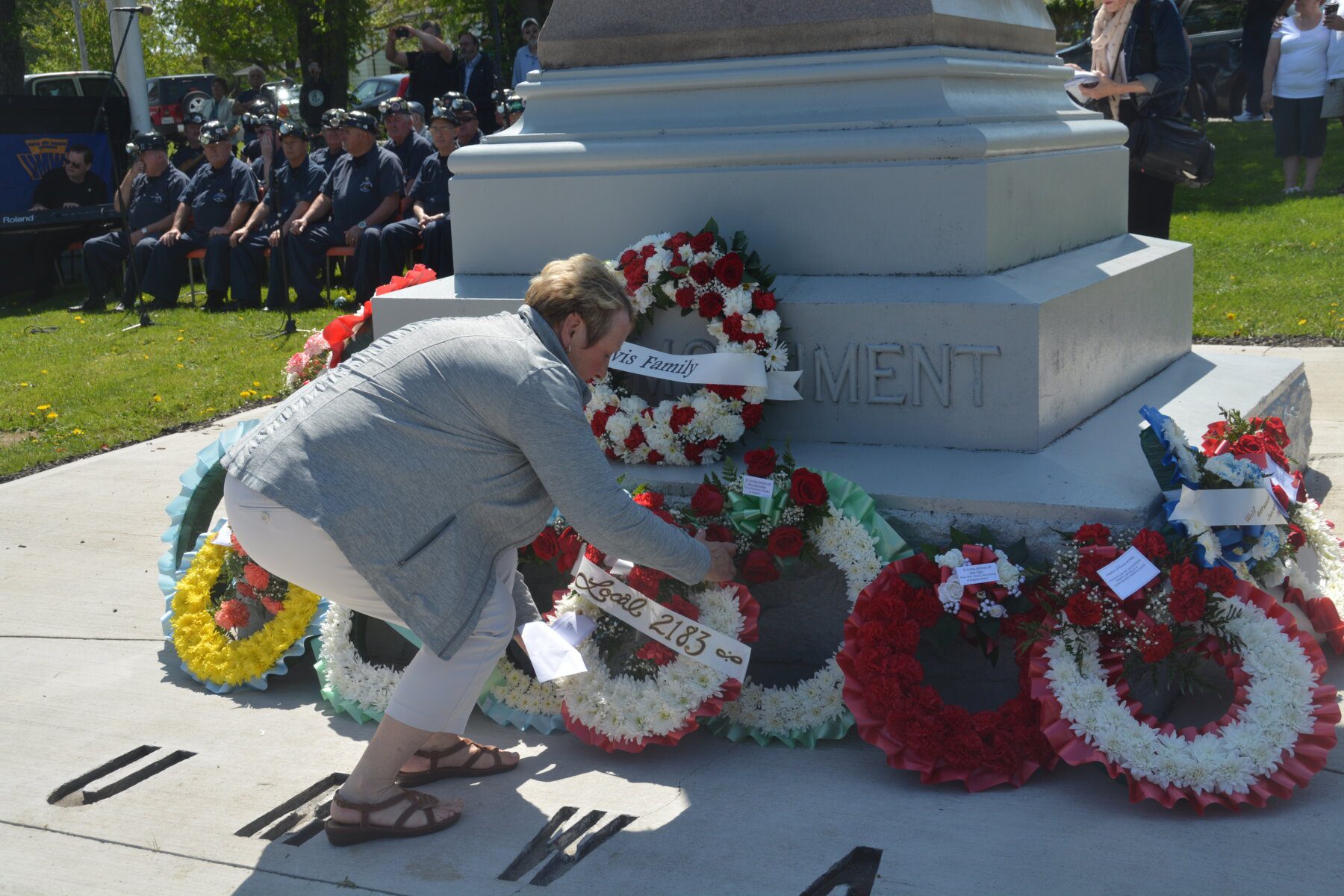Archives: News
This is for all News Pages
Associate Membership Spotlight
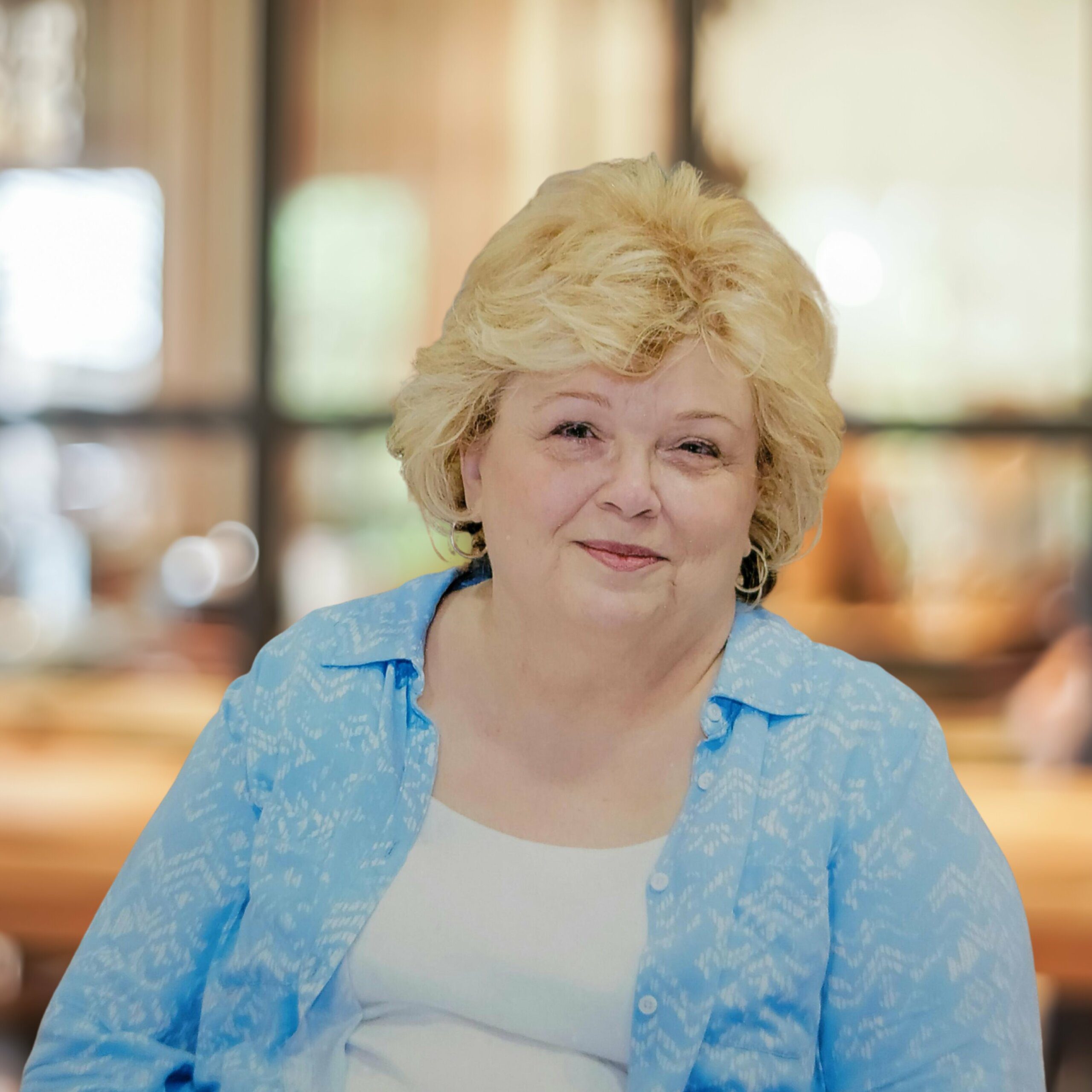
Linda Waugh
The next Associate Membership Spotlight shines on Sister Linda Waugh! Linda Waugh dedicated her career as a secretary in the District 17 office in Logan, West Virginia, from 1973 to 2006. Even after her official retirement, she continues to serve as a temporary secretary in District 17 whenever her expertise is needed. As an Associate Member, Sister Linda remains proactive by ensuring her dues are paid monthly, directly from her UMWA pension check.
“Linda is a wonderful person,” said International District 17 Vice President Brian Lacy. “She helps complete pension and health care applications and promotes the UMWA both in the office and throughout her community.”
Linda’s dedication to the union is deeply rooted in her family history. Her father was a retired UMWA member who instilled in her the value of union membership from an early age. Reflecting on her family’s legacy, Linda shared, “I am so thankful for my union benefits that took care of my father and mother for their entire life.”
In 2024, Linda will celebrate 50 years of dedicated service to the UMWA. Beyond her union work, she is actively involved with the youth program at her church and cherishes spending time with her children and grandchildren. Sister Linda Waugh’s unwavering commitment and contributions to the UMWA and her community are truly commendable.
Union Plus: Hotel Discounts
Source: Union Plus
Dreaming of a summer holiday?
Wherever your summer travels take you — we’ve got up to 50% off hotel deals waiting there for you.*
Book your next hotel stay + save up to 50% off!
Hot Vegas Deals, All Summer Long
Your summer just got VERY VEGAS
Iconic hotels, Elvis, and the Eiffel Tower — and ALL a top-down drive away from the Grand Canyon! Book your VERY VEGAS summer stay for up to 50% off — TODAY!
Get up to 50% off Vegas hotels
Travel ideas
No Passport? No problem!
Union members don’t need a huge budget or a passport to experience a luxury vacation. Save up to 50% on hotel stays* in no-passport-required hot spots like Puerto Rico, St. Thomas, St. Croix, and more!
Union families save up to 50%
More vacation for less
You work hard — it’s time you get more for WAY less!
More properties | 1 million+ hotels, B&Bs, resorts + more
More flexibility | Life happens…so many bookings are flexible
More support | Get support 24/7
Hassle-free booking + BIG union savings of up to 50%
UMWA officials call for meeting with Monongalia County commissioners
Source: W.V. MetroNews
June 12, 2024
MORGANTOWN, W.Va. — Members of the United Mine Workers of America want to continue their dialog with the Monongalia County Commission on behalf of employees in the county assessor’s office.
UMWA Director of Communications Erin Bates said in recent weeks the back and forth has included questions about pay, benefits, and a perception of favoritism in the assessor’s office. Bates said union representation would allow each side to negotiate a contract that could be implemented to address the issues concerning the employees.
“There’s a lot of he said, she said with the commissioner’s office,” Bates said Wednesday on WAJR’s “Talk of the Town.” “The employees are saying you’re doing this, and the commissioners are saying we’re doing that, and at the end of the day, a contract is going to rectify a lot of those issues.”
According to commissioners, one assessor’s office employee has approached them about questions and clarifications about the wage and benefit system, and they believe those answers have been provided. Based on the information available, beyond favoritism claims, there were no other direct issues that were identified that workers were having a problem with.
“They want someone to come in and help create a fair, just atmosphere in their workplace,” Bates said. “So, for each little gritty issue that the employee might have, they took the time to come to the union to ask for help, and then they obviously believe they need help.”
Bates said union representation would ensure that all workers in the office are treated the same. The negotiations and contract would provide the framework for expectations and a means to litigate disputes for commissioners and workers in the assessor’s office.
“If I’m doing the exact same job as my co-worker and that person and I are working the same amount of hours and doing the same amount of work, there’s no reason that person should be making substantially more than me.”
Commissioners have said verbally and in writing that there is no resolution needed to allow the employees to hold an election for union representation. The commission has continued to tell the workers they have the right to vote and organize.
“But in the exact same breath, they’re saying they won’t recognize the union if the vote is yes,” Bates said. “So at the end of the day, it’s worse than a broken promise because if you aren’t going to recognize the union if they vote “yes,” what’s the point of voting “yes” for a union?”
Commissioner Tom Bloom was a counselor and coach in the Monongalia County Schools system for 32 years and echoed their position during the regular meeting on Wednesday, June 12.
“We’ve made it very clear; the law is clear, and being part of a union, I’m very knowledgeable about this,” Bloom said. “An election can happen at any time; there is no need for any input from the county commissioners.”
UMWA officials are calling for a meeting with commissioners to work on the details of a vote and who employees would actually bargain with if the union is approved by the workers.
Written By:
Union Plus: Online college degrees designed for working adults

Affordable college for union families
Discover exclusive union family discounts, financial aid and grants — so that costs don’t stand in the way of your family’s education dreams.
Earning a degree can be difficult with everyday responsibilities. Online classes have made it easier, but it can still be expensive. The Union Plus College Program aims to help you and your family earn a degree affordably and on your own terms.
Your dream of college starts here
AffordablePutting affordable degrees within reach |
100% online classesConvenient schedules that work with your busy life |
Choose from a large selection of degree programs |
What degree are you interested in earning?
I’m interested in earning an associate degree| |
I’m interested in earning a bachelor’s degree| |
Associate degree program |
Bachelor’s degree programs |
|
Choose from a large selection of
Associate of Arts and
Associate of Science programs
Earn an affordable,
online associate degree
that fits your schedule, interests,
career goals and budget.
|
Choose from a large selection of
Bachelor of Arts and
Bachelor of Science programs
Earn an affordable,
online bachelor’s degree
that fits your schedule, interests,
career goals and budget.
|
Explore Online Degrees Today!
MSHA silica dust rule takes effect
Source: TimesNews
June 17, 2024
LOUISVILLE, Kentucky– Monday marked the start of tighter silica dust exposure limits for miners across the U.S.
Assistant Secretary for Mine Safety and Health Administration Christopher Williamson joined a roundtable meeting with Kentucky Congressman Morgan McGarvey, D-3rd, federal mine health experts and activists from Kentucky and Southwest Virginia to announce the first day of the rule’s implementation.
The rule applies to all metal and non-metal mining operations in the U.S.
The U.S. Department of Labor finalized the rule in April in response to several years of miner health data that showed rising incidences of black lung disease and silicosis among miners in their 30s and 40s.
“Mine safety rules are written in blood,” McGarvey said at the start of Monday’s meeting. “Miners have worked in dangerous conditions, and they’ve done it to power America.”
Williamson said the rule cuts allowable eight-hour shift exposure to silica from 100 micrograms to 50 micrograms while placing increased responsibility on mine operators to ensure compliance with the new standards.
“The expectation is that miners should have a safe work environment,” said Williamson. “This rule has been a long time coming.”
Data gathered from black lung clinics in the central Appalachian region has shown that black lung incidences among miners had been on a decline since passage of the federal Coal Act in the 1970s and increased safety standards.
As coal seams became harder to reach and required cutting through increasing amounts of rock, miners’ exposure to the resulting silica dust meant growing incidences of lung damage in miners at younger ages.
Respiratory specialist Dr. Brandon Crum told meeting participants that silica – more damaging to lung tissue that coal dust – also is a known carcinogen in addition to accumulating in miners’ lungs.
“We’ve seen a 400% increase in lung transplants across (U.S.) miners,” said Crum, adding that even lung transplants may offer only about five years of life to miners receiving transplants.
“It’s a dismal prognosis, said Crum. “There’s no cure for black lung. We can treat is symptomatically, but the disease will continue to progress after they leave the mines.”
Nickelsville resident and retired miner John Robinson said he developed silica exposure from two years of cutting 3,000 feet into a rock slope at one operation before the company reached its first coal seam.
“There’s so much rock in it,” said Robinson, “and that’s what’s killing us.”
Robinson’s wife, National Black Lung Association Vice President Vonda Robinson, credited McGarvey, Williamson, Virginia U.S. Senators Mark Warner and Tim Kaine for their cooperation with other Congressional leaders in advocating for the new dust rule.
“Miners sacrifice their whole body and lungs, said Vonda Robinson. “We need now to help get more money to enforce the rule.”
Dr. Scott Laney of the National Institute for Occupational Safety and Health said the higher silica concentrations in miners’ lungs were not seen in the 1960s and 1970s.
“If you live in the central Appalachian region, you don’t need a government epidemiologist to tell you something’s been wrong for the last 20 years,” said Laney. “Black lung is as bad as it’s ever been.”
While MSHA will be increasing enforcement efforts under the new dust rule, Williamson said miners will be key in helping the agency know about violations.
“But (miners) need to know that they have an agency that’s got their back,” Williamson added. “There’s a generation of miners that have exchanged their health to provide for their families, and we should not accept that as a cost of doing business. The rule is effective today, but there’s a lot of work to do.”
Written By:
2024 William Davis Miners’ Memorial Day
Today, on June 11th, the United Mine Workers of America pay tribute to William Davis Miner’s Memorial Day (Davis Day) in memory of William Davis.
On June 11, 1925, William Davis, a 37-year-old miner, was killed when company guards opened fire on a group of striking miners near New Waterford in Nova Scotia. This incident occurred during a period of intense labor strife between the miners and the British Empire Steel Corporation (BESCO), which owned the mines. The miners were striking for better working conditions, fair wages, and recognition of their union rights.
The confrontation that led to Davis’s death took place at a time when tensions between the miners and BESCO were at their peak. The company had a history of employing harsh tactics to suppress labor unrest, including the use of armed guards. On the morning of June 11, 1925, miners were marching in protest when they were met with gunfire from company guards. Davis was struck and killed, leaving behind his pregnant wife and nine children.
William Davis’s death had a profound impact on the labor movement in Nova Scotia and across Canada. His sacrifice became a symbol of the struggle for workers’ rights and the fight against oppressive labor practices. Davis Day serves not only as a memorial for Davis but also as a day to remember all miners who have lost their lives in the pursuit of fair labor conditions.
William Davis was a dedicated family man, deeply affected by personal tragedy even before his untimely death. He had worked in the Springhill mine, a site known for its dangerous working conditions. His older brother, Thomas Davis, had died in a mining disaster in 1891 at the young age of 14. This personal loss highlighted the perilous nature of coal mining and the urgent need for improved safety measures.
The 99th anniversary of Davis’s death, observed on June 11, 2024, marks nearly a century since the tragic event. Each year, commemorations include ceremonies, educational events, and gatherings organized by labor unions and community groups. These events serve to honor the memory of William Davis and other miners, raise awareness about the history of labor struggles, and advocate for continued improvements in workers’ rights and safety.
Davis Day is an important reminder of the ongoing struggles faced by workers and the importance of solidarity in the labor movement. It underscores the sacrifices made by individuals like William Davis and the progress that has been achieved through collective action. The day also calls for reflection on the current state of workers’ rights and the continuous efforts needed to ensure fair and safe working conditions for all.
As we observe this day, we remember the sacrifices made by miners like Davis and renew our commitment to advocating for the dignity, safety, and rights of workers everywhere.
Some Monongalia County Assessor’s Office employees say they have no confidence in the county commission
Source: WVMetroNews
June 5, 2024
MORGANTOWN, W.Va. — A group of workers in the Monongalia County Assessor’s Office say they have no confidence in the Monongalia County Commission and that’s why they want to join a union.
A member of the Monongalia County Assessor’s Office addressed county commissioners Wednesday about their efforts to organize with the United Mine Workers of America. The workers want a resolution from the commission. It’s unclear how many workers want to join the union.
Assessor’s office employee Amy Gumney told commissioners the group of employees has approved a no-confidence vote in the county commission and they want to be represented by the UMWA in order “to keep everything honest.” She accused commissioners of operating a “good old boys club” and not being transparent or accurate about pay and benefits information.
She said the county has a current surplus of about $8 million, and the expected tax revenue in the current year would add another $5 million to that figure. Gumney expects some of that surplus to be directed toward increased wages and benefits for workers struggling in the current high-inflation economy.
“So with that kind of surplus, I have to ask why?” Gumney questioned. “Our insurance premiums continue to go up, our deductible has gone up, our coverage is 90–10, and the cost of living has skyrocketed, so why do you choose not to give a cost of living raise to the employees that keep the county in that surplus?”
Gumney criticized commissioners about comments to the media.
“You tell tell half-truths to the media concerning our insurance and pay raises,” Gumney said. “For example in June of 2023, you told WAJR our premium increase for 2023 would be $17 per month when in truth it was double that.”
She said a recent bonus that was announced for all employees really wasn’t a clear statement. Additionally, she said only 20 employees in the assessor’s office did receive the bonus.
“Every year I’ve been here, we’ve given the employees something, so we certainly wanted to take care of the employees who take care of us,” Gumney presented. “What he failed to mention is that if an employee has been given any type of raise that year, you did not give them a cost of living raise.”
UMWA District 31 Vice President Mike Payton said the commission is represented on the state level by the West Virginia Association of Counties. Payton said the county is required to pay dues, and the organization acts on their behalf, much like a union, according to Payton.
“It’s kind of hypocritical when you’re part of an association that lobbies on your behalf and speaks as a third party, and you look at your workers and say, Do as I say, not as I do,” Payton said.
Commissioner Jeff Arnett explained that there is no requirement for approval from the commission to seek representation. Arnett continued that they have communicated that to the employees verbally and in writing.
“We don’t have a required action to approve the assessor’s office employees to have a vote. If they want to have a vote, they can have a vote at any time; they don’t have to have our permission to do that,” Arnett said. “That’s what was stated in our letter, and that’s been our position all along, so we have not denied an opportunity to have a vote.”
The county commission has said the workers don’t need a resolution from them to join a union.
Written By:
UMWA to Mon County Commission: We’re not going away
SOURCE: The Dominion Post
DATE: June 5, 2024
UMWA to Mon County Commission: We’re not going away
Since talk of potential United Mine Workers of America representation in the county assessor’s office became public in late April, members of the Monongalia County Commission have kept the issue at arm’s length by stating they were unaware of any county employees supporting such activity.
That changed Wednesday.
Amy Guminey, an employee in Assessor Mark Musick’s office, told the commission she represents the employees of the assessor’s office that are requesting UMWA representation.
She did not say how many of the 41 office employees are included in that group.
“Let this serve as notice from the members of the assessor’s office seeking representation from the UMWA that we have voted no confidence in our county commission,” Guminey said, explaining, “You participate in a good-ol’-boys club and are indignant and rude when questioned; or condescending remarks when we try to participate in meetings.”
Guminey’s comments come two weeks after the commission said it need not and would not take any action on a resolution supporting a union vote in the assessor’s office, and that the body doesn’t believe third-party representation is in the best interest of the county or its employees.
Guminey said the commission offers half-truths in terms of cost-of-living raises and employee insurance benefits. Further, she said the commission provided one employee a raise of $7,916 and one “special” employee a raise of $9,499 in March 2022.
Following the meeting, The Dominion Post asked if the raises in question went to County Administrator Rennetta McClure and office manager/grant writer Collene Coon.
While Commission President Sean Sikora said he couldn’t be sure who was being referenced, he said both McClure and Coon did receive significant raises after a statewide comparison of similar positions.
“We have a staff of two and they have been given more responsibilities. I assume that’s what they’re talking about,” Sikora said.
Commissioner Jeff Arnett offered further.
“In Kanawha County, each commissioner has a personal assistant. They have five office staff. The commissioners have brand-new Tahoes to drive,” Arnett said. “Rennetta literally probably does the work of three or four people. We work on a shoestring budget.”
As for COLA raises, the commissioners said it’s the county’s longstanding policy that if an elected official, in this case the assessor, gives some or all of their employees raises in the second half of the year, the commission does not give those employees another increase when considering the following fiscal year’s budget.
“They’re cherry picking, too. Over the last two years through the regular budget process, we have significantly increased employee salaries where the office holder has asked for those increases,” Sikora said.
The commission says it welcomes any examination and comparison of the health insurance benefits offered to county employees.
At the end of the day, the commissioners reaffirmed their position that there is no action required from them for employees to take a union vote at any time, just as there is no requirement the commission honor the outcome of such a vote.
“If they want to have a vote, they can have a vote at any time. They don’t need our permission to do that. That was what was stated in our letter and that’s what was stated all along,” Arnett said.
United Mine Workers of America District 31 Vice President Michael Payton said he believes the commission’s stance is hypocritical considering the county pays dues to be represented by the County Commissioners Association of West Virginia, which lobbies on its behalf.
“To me, in my world, that’s called a union. Everybody else calls it an association … It’s kind of hypocritical when you’re part of an association that lobbies on your behalf and speaks as a third party to then look at your workers and tell them ‘Do as I say and not as I do,’” Payton said, adding, “We’re not going away.”
Written by: Ben Conley
Mon County Commission Meeting – June 5, 2024
Mon County Assessor’s Office employee and Mon County Resident Mike Payton attended and spoke at the Monongalia County Commission Meeting held at 10:00 a.m., June 5, 2024.
Thanks to the Mon County Commission for agreeing with us to respect county employees‘ right to vote for a union.
Now:
Will you respect the election process?
Will you respect the results?
We will.






